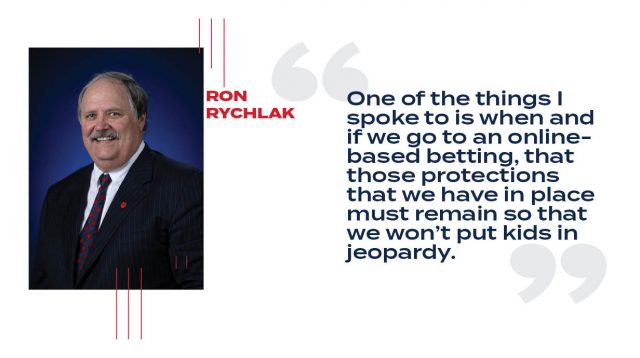
Lt. Gov. Delbert Hosemann has appointed University of Mississippi law professor Ronald Rychlak to the state’s first mobile-online sports betting task force.
House Bill 606, which passed by overwhelming vote in March, decreed that 13 experts across the state would be convened for the task force. The committee will study the intricacies and challenges of legalizing mobile-online sports betting in the state.
Under Hosemann’s direction, David Blount, chair of the Senate Gaming Committee, in August invited Rychlak, distinguished professor of law and Jamie L. Whitten Chair of Law and Government, to join.
While the economic benefits of legalizing mobile sports betting could be large, Rychlak cautioned against hasty implementation that could leave people at risk.
“One of the things I spoke to is when and if we go to an online-based betting that those protections that we have in place must remain so that we won’t put kids in jeopardy,” said Rychlak, who is also a faculty athletics representative at Ole Miss and co-author of “Gaming and Gambling Law: Cases, Materials and Problems” (Carolina Academic Press, 2021).
“You increase the risk exponentially of threats and bribes to athletes.”
Well over half the country – 34 states and Washington, D.C. – have legalized sports betting in some form. However, since the widespread implementation, several instances of players and people in athletics support roles being threatened and harassed for their performances have been reported.
“When people bet on these things, they take it very personally,” Rychlak said. “They think they have a stake in it.
“I hope we realize when we’re talking about college students and college athletes, that we do everything we can to minimize the risks to students.”
The task force, which first met in September, has a deadline of Dec. 15, to prepare a final report, which will be made available to the public.
“The chairs have made it clear that they expect there to be a bill proposed this legislative session, so the question is what is it going to look like,” Rychlak said. “The end result is to have a piece of legislation that does not overlook important things.
“Having that legislation does not mean it will pass, but they want to have something to take forward that hasn’t overlooked important considerations.”
Mississippi allows only in-person sports betting and geofenced mobile-betting within casino grounds. Some casino operators fear that legalization of online sports betting could cut into their business models, while others see the expansion as an opportunity to draw in new customers.
Before drastic changes in committee, HB 606 was written to legalize mobile-online sports betting in the state. In 2022, four bills that would have legalized online sports betting in Mississippi died in committee. In 2019, two similar bills failed.
Much of the concern involves moral or religious opposition to gambling, Rychlak said. States that have legalized mobile sports betting have seen increases in reported gambling addiction, particularly in men aged 18-35.
However, those interested in sports betting are frequenting other states or illegal casinos, Rychlak said.
“You have to understand that there are people who have gambling problems and are going to suffer from this,” he said. “I’m also concerned just in general about the college kids sitting around with a phone app that is controlled by a gambling industry that can tell you should parlay your losses.
“Everywhere they’ve done this, calls to anonymous gambling addiction hotlines have essentially doubled, and the high-risk area is young men.”
It is common for states to first study the proper implementation of sports betting before legalizing it.
Before legalizing mobile-online sports betting earlier this year, Vermont passed a similar study bill in 2022. Georgia’s lawmakers considered a similar bill earlier this year, though it failed to pass, and New York introduced a study bill in 2018 before legalizing sports betting in 2022.

